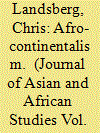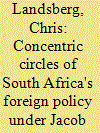|
|
|
Sort Order |
|
|
|
Items / Page
|
|
|
|
|
|
|
| Srl | Item |
| 1 |
ID:
115262


|
|
|
|
|
| Publication |
2012.
|
| Summary/Abstract |
In his book In the Twilight of the Revolution (2009), which is also the subject of this review article, Kwandiwe Kondlo argues inter alia that: '. . . the Africanist orientation of the PAC [Pan-Africanist Congress] was appropriated in the policies of [South Africa's] . . . new democratic government(s), especially during the period of former President Thabo Mbeki' (2009: 282). This author critically examines Kondlo's assertion in the context of South Africa's post-apartheid period and argues that successive South African governments played pivotal roles in helping to shape Africa's evolving inter-state system through diplomacy and the politics of partnership. In that regard, he argues that South Africa's aim is to promote Continentalism (agreements or policies that favour regionalization or regional co-operation between states, or deep and regulated forms of regional co-operation between nations within a continent), a new post-Cold War foreign policy paradigm on the continent, which will assist in the consolidation of the idea of a union of African states that dawned with the birth of the African Union (AU), created to replace the Organization of Africa Unity (OAU). He insists that, in the context of Kondlo's assertion, African Continentalism, as opposed to Pan-Africanism, which advocates the amalgamation of existing independent African states into a bloc, represents a process that encourages African states to band together to create new norms, principles, institutions, and political structures, and agree to live by such structures and in harmony with each other. To buttress his argument, the author examines Thabo Mbeki's African Renaissance project as the corollary of African Continentalism on which South Africa's Africa policy was anchored during and after his presidency.
|
|
|
|
|
|
|
|
|
|
|
|
|
|
|
|
| 2 |
ID:
132307


|
|
|
|
|
| Publication |
2014.
|
| Summary/Abstract |
South Africa's foreign policy could be viewed as a set of concentric circles which define the Republic's international priorities. In an attempt to bring coherence and predictability to them, the Zuma government has tried to learn from its predecessor, the Mbeki government (1999-2008), by putting emphasis on key international relations and concerns, and the idea was suggested that these different layers reinforced each other.
According to stated policy, pursuit of the national interests lay at the heart of the Republic's international strategies and came to be regarded as the new glue that holds it together, albeit it is four years into Zuma's government and the 'national interest' remains poorly developed and in need of expansion and implementation. A set of wider foreign policy concentric circles informs foreign policy, championed as 'Pursuing African Advancement and Enhanced Cooperation'. This agenda was to be pursued under a series of sub-goals or sub-categories, for our purposes concentric circles, namely (a) closing the gap between domestic and foreign policy; (b) continued prioritisation of the African continent-the Mbeki government called it African Agenda, or Africa first policy; (c) strengthening South-South relations; (d) strategic relations with strategic formations for the North; (e) participating in the global system of governance and (f) strengthening political and economic relations. While these six pillars were clearly developed on paper, and self-standing, how they all relate to the epicentre of the national interest and overlap one another is not so clear. More serious effort is needed on the part of government to close this lacuna, and the idea of coherence between them should not be assumed if there is to be consistency between them and the stated annulus of national interest.
|
|
|
|
|
|
|
|
|
|
|
|
|
|
|
|
| 3 |
ID:
066188


|
|
|
|
|
|
|
|